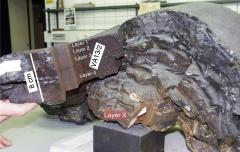⁶⁰Fe and ²⁴⁴Pu in deep-sea archives — a link to nearby supernova activity and r-process sites
Dr. Anton Wallner
(Australian National University, ACT, Australia)
Freitag/Friday, 2016-10-21 14 c.t., EW 561
Eugene-Paul-Wigner Gebäude, Hardenbergstr. 36, 10623 Berlin
Zusammenfassung/Abstract:
The Interstellar Medium (ISM) is continuously fed with new nucleosynthetic products. Presence of radionuclides live in the ISM is evidenced by space-born γ-ray telescopes. The solar system moves through the ISM and collects dust particles. Therefore, direct detection of freshly produced radionuclides ‘live’ on Earth, i.e. before decaying, would provide insight into recent and nearby nucleosynthetic activities. A pioneering work at TU Munich of an ocean crust-sample showed an enhanced $^{60}$Fe signal of extraterrestrial origin — does it originate from a close-by supernova about 2-3 Myr ago?
Within an international collaboration we continued to search for ISM radionuclides incorporated into terrestrial archives via ultra-low single atom measurements using accelerator mass spectrometry (AMS). Here, we report on new experimental results of radionuclide concentrations in the interstellar medium. We have analyzed several deep-sea sediments, crusts and nodules for extraterrestrial $^{60}$Fe (t$_{1/2}$=2.6 Myr), $^{26}$Al (t$_{1/2}$=0.7 Myr) and $^{244}$Pu (t$_{1/2}$=81 Myr) complemented by independent work at TU Munich. I will present a new approach to determine $^{60}$Fe’s half-life value.
We obtained new data for interstellar $^{244}$Pu in collaboration with TU Munich using AMS. The unexpected low abundance of the pure r-process nuclide $^{244}$Pu provides constraints on the r-process frequency and sites. I will present also new results on $^{60}$Fe and will relate them to potential exposure of Earth to recent supernova explosions.


